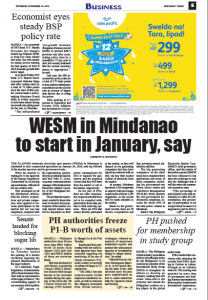
The planned wholesale electricity spot market (WESM) in Mindanao is scheduled to start commercial operations on January 26, 2020, said top officials of the market operator and its governance body.
What the market is waiting for is the approval of the Energy Regulatory Commission on its pricing cap mechanism, officials of the two entities said.
This developed as all the distribution utilities, both the electric cooperatives and private companies, have applied to become participants in the market but not one has completely complied with the requirements, particularly the prudential deposit, said Eric Niño U. Louis, corporate communications manager of the Independent Electricity Market Operator of the Philippines Inc. (IEMOP).
The prudential requirement, needed by those who want to become direct participants of the market, is a cash deposit whose value will be dependent on their power consumptions for DUs or capacity for generators, and the projected volume that they will draw from the market or sell to the market, respectively.
On the part of DUs, there are other documentary requirements that have yet to be complied with, particularly those that pertain to their metering systems. There are DUs that cannot directly participate in the market, so they will depend on the generating companies that they have signed up contracts with so they can buy their needed volume of electricity from the market.
At present, Mindanao has about 3,300 megawatts in capacity with an average requirement of about 2,300 megawatts, so the excess will be made available to the market.
Based on the government records, there are 28 electric cooperatives and four privately-owned distribution utilities.
The big generating companies, on the other hand, have completed their applications and seven of these companies, including the government-run Power Sector Assets and Liabilities Management (PSALM) which operates the two-government hydroelectric complexes, account for about 60% of the total power volume in Mindanao.
Rauf A. Tan, Philippine Electricity Market Corp. (PEMC) chief governance officer, said the system of the market operator IEMOP has been subjected to test since two years ago to look into the challenges that it will face when the commercial operations start.
“(The percentage of participation in the trial operations) is a little bit low; nonetheless, that percentage of participation is not a major factor because it is supposed to just be able to test the system if it works,” said Tan, adding that the trial period will continue until the day before the start of the operations.
At present, the PEMC, which used to be the market operator but has become the governance and the regulatory body of the market, and the IEMOP have been doing roadshows in Mindanao to allow the market stakeholders to practice on how the market processes are done.
Robinson P. Descanzo, IEMOP chief operating officer and trading head, said that the two entities are helping the stakeholders in their market participation.
“The market will do the forecasting (for the distribution utilities) and the DUs will just discuss with the generators how much they will buy (from them) so that what they will buy from the market is very small,” Descanzo pointed out.
In the case of Mindanao DUs, most of them have existing contracts that can cover their requirements, making it easy for them to secure the needed volume that the market will cover.
WESM is part of the Electric Power Industry Reform Act of 2001 which spells out the need to establish an electricity market so that pricing will be dictated by the market with the goal of providing better prices to consumers.
The law states that both generating and distribution utilities need to enlist in the market even if they have existing contracts or they don’t have.
The same law also mandates the government to sell its power assets, although in Mindanao, the government has yet to privatize the Pulangi and Agus hydroelectric complexes which have a combined installed capacity of about 982 megawatts, but a dependable capacity of about 500 megawatts. This electricity volume is part of the portfolio of PSALM.
The good thing with the market is that those DUs that have contracted supply more than their requirements have a mechanism where they can resell their surplus, Mr. Descanzo said. In this way, they can recoup the payment that they paid to the generating companies where they contracted for the excess supply.


